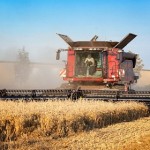Aashna Agarwal (GH): Despite India being an agro-ecologically diverse country, why are those in the agriculture sector still poor? Why hasn’t technology been used better to improve agricultural performance?
Rasha Omar: In my view, there are three reasons why so many of the poor are found in the agriculture and allied sectors: agriculture is low-productivity and subsistence-based; other non-agricultural occupations in rural areas are low-pay and seasonal; and investment is inadequate in the development of basic infrastructure and services in the pockets of poverty.
The uptake of technology by smallholders requires an effective agricultural extension system. Farmers currently get information mainly from agro-dealers. They need better access to agricultural financing, but half of all farmers do not have bank accounts. And with the fragmentation of landholding, a different business model for service delivery – especially for mechanisation and inputs – and marketing is required. The uberisation of agricultural machinery, support to farmer producer organisations and other innovations are a start, but technology also should support a shift from low-value, cereal production to higher-value crop, livestock and fisheries production.
GH: What are good models for India to follow?
Rasha Omar: Historically, agriculture in India has been a state responsibility – and hence, the pattern of agriculture development varies between states. This suggests that India will be developing its own home-grown model.
There are, however, many key lessons from across the world that could be useful to facilitate agricultural development in India, improve farmers’ income, and reduce rural poverty. The main lessons are that developing land-rental markets, improving farmers’ access to loans and financial services, and maintaining a high share of public expenditure on agriculture and R&D, are all important. These key points are all presented in the 2016 edition of IFAD’s flagship publication, the “Rural Development Report on Fostering Inclusive Transformation”.
GH: How can we establish better pricing and market information mechanisms to help agri-business, farmers and policy-makers?
Rasha Omar: Increased investment in post-harvest storage, processing, and logistics (including transport and cold chain infrastructure) are required to support better prices for smallholders. Use of public resources can leverage more private investment from producers and processors/traders.
Policies are required to facilitate:
- Establishment of farmers’ organisations to organise producers, bring production to scale and aggregate produce for sale in formal markets;
- Development of simpler and more efficient systems for business registration, long-term land leasing and land purchase for agro-industrial or manufacturing purposes, and a simpler taxation regime;
- Creation of risk management tools such as insurance and loan guarantees;
- Facilitation and monitoring of interdepartmental collaboration. The Departments of Agriculture and allied sectors; Research and Development, Food processing industries, Small and Medium Enterprises and Industries, and Finance and Revenue could all collaborate more closely to improve policies and measures for value-chain development and market linkages.
GH: Innovations in the agriculture sector have changed agro-business models. How are institutions like IFAD helping agricultural enterprises adapt to these models?
Rasha Omar: IFAD supports efforts of governments in low- and middle-income countries to reduce rural poverty and agricultural development. Integrating smallholders in the development of agricultural value chains will reduce rural poverty and generate economic growth and employment. IFAD’s main contributions to the new generation of agricultural enterprises are:
- Working with partner banks and financial organisations to devise forms of equity – longer term loan with reasonable interest rate or asset insurance to help producers, processors, traders and transporters finance value chain development;
- Organising smallholders into business-driven producers’ organisations;
- Developing fee-based extension and other business development services, including digital technologies, for agri-enterprise growth;
- Helping producers’ organisations tap high-value, niche markets, such as specialty coffee and cocoa;
Building capacity of the government, development practitioners, civil society organisations and producers’ organisations in value-chain development.
Rasha Omar is Country Representative, Asia and the Pacific Division, International Fund for Agricultural Development (IFAD)
Aashna Agarwal is Content Coordinator, Gateway House
This interview was exclusively conducted for Gateway House: Indian Council on Global Relations. You can read more exclusive content here.
For permission to republish, please contact outreach@gatewayhouse.in.
© Copyright 2018 Gateway House: Indian Council on Global Relations. All rights reserved. Any unauthorized copying or reproduction is strictly prohibited.


